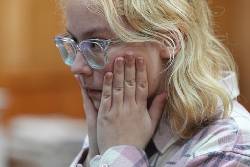A Russian court Tuesday extended the jailing of an 18-year-old street singer on charges seen as punishment for performing anti-war songs, an action denounced by human rights activists as part of a rampant crackdown on free speech over the war in Ukraine.
Diana Loginova was ordered held for another 13 days by the court in St. Petersburg on charges of violating public order with her October performance. It was the third consecutive sentence for Loginova, who has remained in custody since her initial arrest on Oct. 15.
Loginova, a music student who goes by the stage name Naoko in the band Stoptime, also was ordered to pay fines for “discrediting the Russian armed forces.”
Alexander Orlov, a fellow Stoptime member, has been handed repeated sentences along with Loginova. They denied any wrongdoing.
Amnesty International said the repeated detentions, which it called “carousel arrests,” were intended to keep them in custody without filing more serious criminal charges.
Human rights activists say Loginova and fellow Stoptime band members have been targeted for performing songs by other musicians who had opposed the Kremlin's February 2022 invasion of Ukraine and left Russia. Videos of the performance with crowds joining in by singing lyrics critical of the Kremlin and the war have been widely viewed online, triggering calls from pro-Kremlin activists for police to take action.
“The repeated arrests of Naoko and her bandmates are punishment for their public performance, which have become a breath of fresh air in a country gasping under repression and self-censorship,” said Denis Krivosheev, Amnesty International’s deputy director for Eastern Europe and Central Asia.
“Authorities must immediately and unconditionally release Naoko and Aleksandr Orlov and other street musicians detained for acts of anti-war protest, simply exercising their right to freedom of expression," he said in a statement. "Their only ‘crime’ is singing songs that challenge the suffocating official narrative.”
The Stoptime case triggered similar performances in solidarity in some Russian cities, leading to arrests and fines for several performers.
Russian authorities have ramped up their crackdown on dissent and free speech after the Kremlin sent troops into Ukraine, relentlessly targeting rights groups, independent media, members of civil society organizations, LGBTQ+ activists and some religious groups. Hundreds of people have been jailed and thousands of others have fled the country.
...


 Copyright © 1996 - 2025 CoreComm Internet Services, Inc. All Rights Reserved. | View our
Copyright © 1996 - 2025 CoreComm Internet Services, Inc. All Rights Reserved. | View our